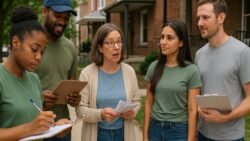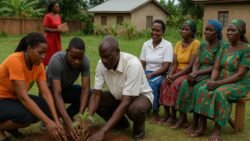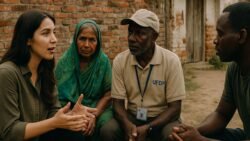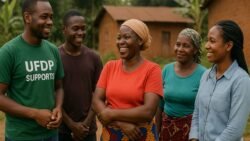Peacebuilding and Development – Join the Movement – Peacebuilding and Development Start With You is more than a call to action; it is a reminder that every individual has the power to create change. At the United Foundation for Development & Peace (UFDP), the focus lies on empowering communities through inclusive programs that combine peacebuilding, education, and sustainable development. Around the world, conflict and inequality continue to disrupt lives, but studies show that grassroots involvement is one of the most effective ways to build resilience and foster long-term stability. When communities unite, they create stronger social bonds, reduce poverty, and open new opportunities for marginalized groups. By addressing issues such as youth empowerment, women’s leadership, and climate resilience, UFDP emphasizes that progress starts with small steps taken by committed individuals. Through advocacy, awareness, and skill-based training, every voice can contribute to building a more peaceful society where justice and equality become shared values for future generations.
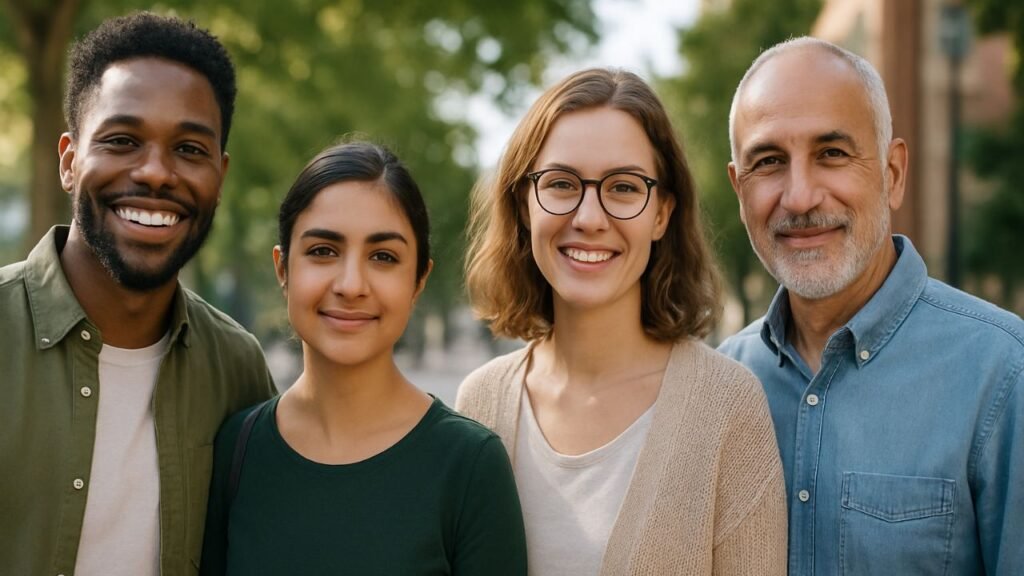
Understanding the Link Between Peacebuilding and Sustainable Development
Peacebuilding and sustainable development are deeply interconnected. Without peace, development efforts collapse; without development, peace cannot be sustained. International frameworks such as the United Nations Sustainable Development Goals highlight that eradicating poverty, reducing inequalities, and ensuring access to education are essential to lasting peace. UFDP works at the crossroads of these goals by supporting projects that encourage dialogue, prevent violence, and create economic opportunities. For example, local youth initiatives often combine vocational training with conflict-resolution workshops, ensuring that young people gain both practical skills and the mindset to resolve disputes peacefully. Community-based development models also show that empowering women with resources and decision-making authority reduces the chances of recurring conflict. By addressing structural inequalities and promoting fairness, societies can move away from cycles of instability. This holistic approach not only prevents conflicts but also establishes foundations for inclusive economic growth and social harmony.
The Role of Communities in Driving Peace and Progress
Real change begins at the community level, where individuals live, work, and face daily challenges. Grassroots organizations and local leaders play an essential role in shaping peace initiatives because they understand the cultural and social dynamics better than external actors. According to Peace Agreements Database, community-driven peace accords are more likely to endure because they reflect the priorities of local populations. UFDP leverages this principle by involving communities in every stage of its development projects, from planning to implementation. Whether it is creating agricultural cooperatives to strengthen food security or running workshops that teach conflict mediation, these initiatives are designed to be inclusive and sustainable. Communities that actively participate in decision-making processes feel a greater sense of ownership, which in turn fosters accountability and long-lasting results. The combination of traditional knowledge with modern strategies empowers local populations to become architects of their own peaceful futures.
How Education and Youth Engagement Shape Peacebuilding
Education is one of the strongest tools for peacebuilding, as it equips individuals with knowledge, critical thinking skills, and empathy. Research from UNESCO shows that inclusive education reduces intolerance, builds social cohesion, and decreases the risk of violent conflict. UFDP integrates education with youth empowerment by providing platforms for young people to lead change in their communities. Programs that combine classroom learning with community service, debate forums, and cultural exchange enable youth to understand the importance of tolerance and diversity. Additionally, vocational training allows them to gain employable skills, reducing unemployment, which is often linked to unrest. Young leaders trained in peacebuilding techniques also act as role models, spreading positive values across peer groups. By investing in the next generation, UFDP ensures that youth are not only beneficiaries but also key drivers of sustainable peace and development.
Building Global Partnerships for Lasting Impact
No organization or community can achieve peace and development alone; global partnerships are essential. According to the World Bank, collaborative programs involving governments, civil society, and international institutions significantly improve the success rate of peacebuilding initiatives. UFDP collaborates with NGOs, academic institutions, and international agencies to design projects that combine local knowledge with global expertise. These partnerships allow for resource sharing, policy advocacy, and large-scale impact. For instance, joint initiatives on climate resilience not only address environmental threats but also reduce the competition over scarce resources that often leads to conflict. By promoting dialogue between stakeholders, UFDP strengthens cooperation across borders, ensuring that peace efforts are sustainable and inclusive. The emphasis on collective responsibility demonstrates that while peacebuilding starts with individuals, it flourishes when supported by global solidarity, creating a future where development and harmony are shared across nations.

